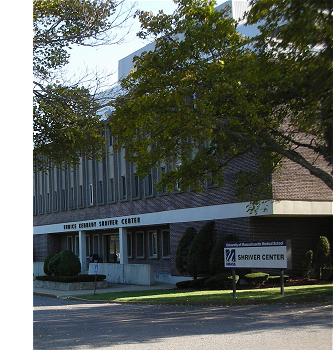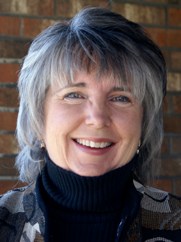This is the final installment of UMassMedNow’s three-part series on UMass Medical School’s Eunice Kennedy Shriver Center in Waltham. Read part 1: Teens get moving, have fun and part 2: New center offers vital insurance information. Also see how the Medical School’s building turned blue on Friday, April 1, for World Autism Awareness Day.
 |
The endorsements from alumni talk of life-changing experiences, of knowledge gained that added direction and purpose to professional and personal lives, while helping to change the lives of people with autism and other developmental disabilities. What’s clear is the Leadership in Education in Neurodevelopmental Disabilities (LEND) Program at the Shriver Center has many success stories, both for the fellows who have gone through the program and for those helped by the systemic change these leaders created.
“Previous to LEND, I was feeling powerless as a health care professional caring for the voiceless, one person at a time,” said one alumna, a physical therapist. “LEND opened my perspective, allowing me to see that systems change is possible. I am energized, feeling capable to promote change.”
One of 39 nationwide programs funded by the Maternal and Child Health Bureau of the federal Health Resources and Services Administration, LEND trains clinical and other professionals to become leaders who advocate for and actively improve services and supports that help individuals and families affected by autism and other intellectual and developmental disabilities.
The LEND program has two training tracks: Leadership in Clinical Care and Advanced Leadership Fellowship Program. The Clinical Care program focuses on interdisciplinary clinical training for individuals in pre-service programs pursuing master’s or doctoral degrees in specific clinical disciplines. LEND supports clinical training at UMMS, Tufts Medical Center and Boston Medical Center. Within these settings thousands of individuals and their families also receive diagnostic and treatment services each year.
“Children with developmental disabilities have complex problems, and complex problems require an interdisciplinary approach,” said LEND Associate Director Carol Curtin, MSW, research assistant professor of family medicine & community health. “We train physicians, nurses, social workers, occupational therapists, physical therapists, speech language pathologists and other professionals from a host of other disciplines. But we also take a step beyond the clinical world, and include family members as an integral part of the interdisciplinary team.”
The second track, the Advanced Leadership Fellowship Program, is an intensive nine-month program for experienced clinicians and family members who want to bring about systems change. The program supports fellows to develop the skills necessary to bring about change within organizations, communities and across systems. A unique aspect of the program is the opportunity for fellows to earn credits toward a master’s degree in public administration, thanks to a partnership with the Suffolk University Sawyer School of Management.
“Not only do our LEND Fellows acquire the knowledge and skills they need to be effective, they also earn a credential,” said Curtin.
One obvious example of the fellowship program’s success is Amy Weinstock, who initially conceived the recently passed Massachusetts legislation “An Act Relative to Insurance Coverage for Autism” (ARICA) while she was a LEND fellow. After completing her fellowship, Weinstock became chair of the Insurance Committee for Advocates for Autism of Massachusetts, a position from which she and several other LEND colleagues advocated for passage of the legislation. [See related story: New center offers vital insurance information.]
 Carol Curtin |
“ARICA is one of the strongest and most comprehensive pieces of legislation in the country,” said Curtin. “Amy has a daughter with autism and knew first-hand of the many systems barriers that needed to be addressed. The lack of insurance coverage for children with autism was a major deterrent to obtaining appropriate and comprehensive care, and Amy set out to change that system.”
Other success stories are less public, but equally life changing for alumni.
“My LEND experience helped to underscore the importance of communicating effectively with students, parents, administrators and peers to ensure student success,” said another alumnus, who works as a clinician and an educator. “The lessons learned through the LEND program have influenced my participation in leadership roles within my profession.”
While the interdisciplinary training is the centerpiece of the LEND program, it is just one part of the overall mission to improve the health of children with autism and other developmental disabilities and their families. For example, LEND is the state lead on the Massachusetts Act Early Campaign, which involves a coalition of professionals and parents representing health care, education, early childhood, clinical services and related specialties. As part of the campaign’s many efforts to increase public awareness about autism, increase training opportunities for providers and other professionals, and shorten wait times for evaluation and treatment services, the team is developing a culturally sensitive autism screening protocol and a multilingual screening kit in several languages that will be distributed to 55 community health centers and approximately 300 pediatric practices across the state by November 2011.
The Shriver LEND program also has a unique focus on health promotion in children with autism and developmental disabilities. LEND faculty and staff conduct research and training and provide community services around nutrition, physical activity and obesity prevention and treatment in children with developmental disabilities, including autism. [See related story: Teens get moving, have fun].
But it may be the individual journeys taken by LEND fellows that create the biggest impact for the autism community. LEND alumni have gone on to serve as directors of city public health departments, directors of clinical services and officers in state departments of education. Several have won prestigious awards for their leadership, advocacy, teaching and clinical work. Many are now faculty members at medical schools, universities and other institutions of higher learning, where they make regular contributions to scientific and peer-reviewed journals and books.
The words of a LEND alumna sum up the accomplishments of many LEND graduates: “None of these things would be possible without the LEND program and I am thankful every day that I had that opportunity to help myself and to help others.”
Related Links:
Autism at Shriver, part 1: Teens get moving, have fun
Autism at Shriver, part 2: New center offers vital insurance information
Donna Shalala to speak at Commencement 2011
Blue lights mark Autism Awareness Day
Passionate advocate links community to Shriver Center